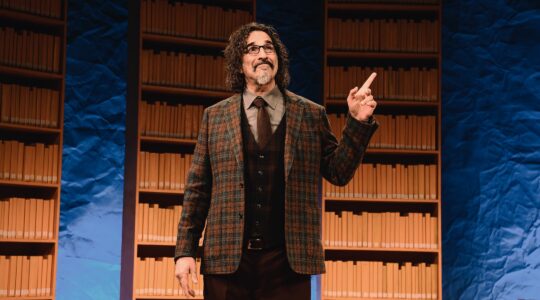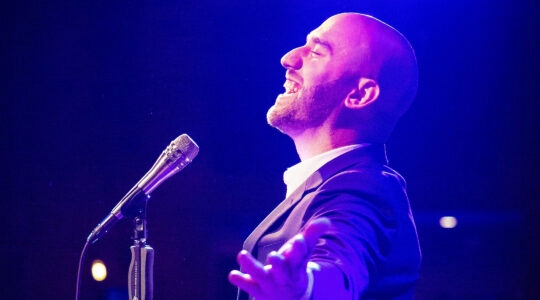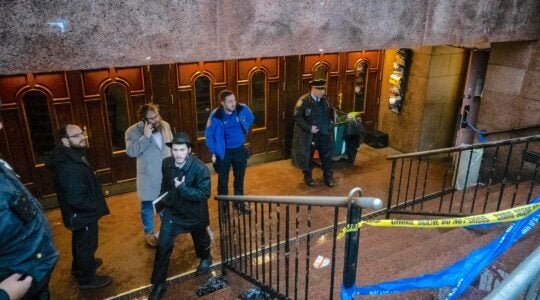Philip Roth, in the 1950s, wrote a story about Ozzie, a Jewish kid who knew, just knew, that if God could make the heaven and the earth in six days, God could do anything. Ozzie would say, ìthe light especially, thatís what always gets me, that he could make the light. … Making fish and animals, thatís pretty good ó but making light … and He could pick the six days he wanted right out of nowhere.îThat sense of wonder is one of the gifts of Jewish childhood. It happens every autumn, as first- or second-graders are introduced to one of the most famous opening sentences in the history of the written word: ìIn the beginning…îThis weekend is Simchat Torah, as well, when the wooden handles of Torah scrolls are whirling, rewinding from Moses on Nebo to Adam in Eden. Jews dance with Torahs, out through the vestibules and into the streets, past the police sawhorses and into the midnight hours. Men share bottles; kids collect candy and ride aloft shoulders.Yet, the gentle phrases of the worldís birthing have become a battlefield, with secularists fiercely protesting its presence in the public classroom. Did God create the world in 144 hours or not?In Kansas, recently, the state Board of Education opted to teach the Bibleís view of Creation, removing evolution from the curriculum.In response, Phil Baum, executive director of the secular American Jewish Congress, said: ìFine, but why stop there? The world is flat. The sun revolves around the earth. … What about the atom? Itís too small to see. No atom means no splitting of the atom, therefore no bomb. Thanks to Kansas, the world will be a safer place.îHowever, Baumís assertion that belief in creationism means a disbelief in all science is disproved by Chabad-Lubavitch. Despite their creationist school system, their rebbe ó Menachem Mendel Schneerson, who died in 1994 but whose writings still guide the movement ó studied engineering and the sciences at the Sorbonne, the Polytechnic Institute of Paris, and the University of Berlin.In one letter, the rebbe explains that early in Creation, ìconditions of temperature, atmospheric pressure, radioactivity and a host of other cataclysmic factors, were totally different than those existing in the present state of the universe. … One cannot exclude the possibility that dinosaurs Ö became fossilized under terrific natural cataclysms in the course of a few years rather than in millions of years, since we have no conceivable measurements or criteria of calculations under those unknown conditions.îRabbi Dov Lerea, principal of Judaic studies at the Heschel School (Conservative), says: ìWhen I have this discussion with teachers in sixth, seventh or eighth grade, I say that science and Torah are totally different disciplines. Science is a way of disciplining human observation, experiencing the world with our senses and experimentation; the study of the Torah, on the other hand, is to understand ó from Godís perspective ó what role do human beings play in this world?ìWith the lowest elementary grades, we entertain all questions that kids want to ask, and help them find ways of exploring answers to their own questions. We donít ask anyone to think that learning Torah is a stifling experience that disallows questions, or that science is so dogmatic that you canít entertain other theories and hypotheses of how the world was put together.ìThe first two chapters of Bereshit [Genesis] are ultimately not about chronology. They form a picture of Creation that is like concentric circles rippling in a pond, forcing us to ask: who is in the center?îMarvin Schick, president of the four Rabbi Jacob Joseph-affiliated schools (Orthodox) on Staten Island, points out that the first verses of Genesis are almost always taught in the younger elementary grades, when Torah study is introduced. ìYouíre dealing with children for whom big theological thought is beyond their capacity,î says Schick. ìSo, ëThis is what the Torah says, this is what happened.í îSchick says that when pressed by older students, ìmost rebbeim say, ëWhat I believe is based on emunah [faith], not scientific study.í In yeshivas, we may ignore science, but we donít insist that itís wrong. From a kasha, shtarben mir nisht ó you donít die from a question. Donít get yourself so excited; so you have a question. Good. Think about it, explore, and maybe youíll find answers.îRabbi Aaron Fink, principal of Rocklandís Ashar elementary school (Orthodox), says, ìWe teach the kids that there is a scientific world they must comprehend, but they also must know that 5,760 years ago God made something new with the creation of man in Godís image. What happened before Adam, we really donít know much about.îThe Torah doesnít say that much, either. Only 31 Hebrew sentences tell the story of Creationís six days. Even that is too much for some sages; the very first Rashi commentary, taught in all day schools, asks why the Torah even begins with Genesis at all? The Jewish calendar and Rosh HaShanah, in fact, are calculated from Day Six, not Day One.Rabbi Fink points out that the creationist-evolutionist argument is literally a chicken-or-egg debate. ìWeíre taught that Adam was not created as a baby but as a fully grown adult. God just as easily could have made a mature world,î without the evolutionary process, ìjust as He made a mature man.îIf a child asks about a 10 million-year-old fossil, Rabbi Fink says heíd answer, ìSure. Weíre taught by the rabbis that God created many worlds before this one. God put things in this world for us to learn from, say, for a medical advance. The question isnít whatís it doing here; the question is how are you going to be a better servant of God, a better Jew, as a result of this knowledge? We have to look for better ways to serve, not for excuses not to.îOf course, Genesis is not all there is. As Solomon says in Ecclesiastes, with that perennial wonder of a Jewish child, ìGod has made everything beautiful in its time; also he has put an enigma into manís mind, so that he cannot find out what God has done from beginning to end.î This is the first of regular columns visiting the world of Jewish education. If you have any suggestions or knowledge of areas worth exploring ó teaching, parenting, school administration, school or personal finances, curriculum, etc. ó please e-mail jonathan@jewishweek.org
The New York Jewish Week brings you the stories behind the headlines, keeping you connected to Jewish life in New York. Help sustain the reporting you trust by donating today.




